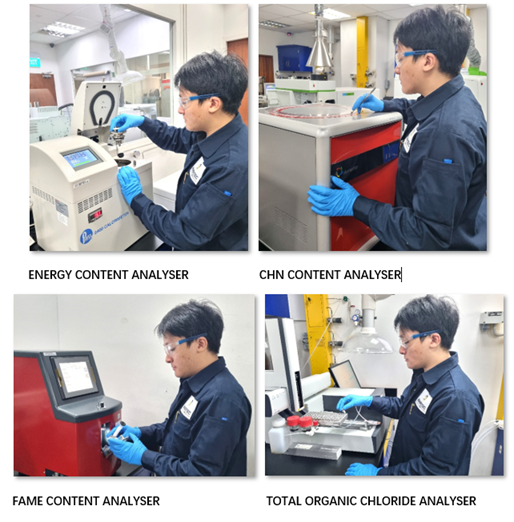News & Events
Related Pages
BioFuel Testing and Key Pre-emptive Measures
As on 06 May 2024
Introduction
TO LOOK TO THE FUTURE, LET’S TAKE A SMALL STEP BACK…
Owing to several influencing factors, mainly stemming from concentrated efforts towards achieving crucial sustainability and decarbonization goals, the use of BioFuels is gaining swift momentum as a transitional fuel in the Maritime industry.
The advantages of BioFuels as a promising transitional fuel for vessels, in particular biodiesel blends, are that they can be used as drop-in fuel without modification of existing marine diesel engines and the Fatty Acid Methyl Esters (FAMEs), a primary component, do not emit Sulfur Oxides (SOx) during their combustion.
Over the last few years, regulatory bodies have also determinedly progressed on building viable frameworks and guiding principles on robust compliance requirements, implementation of transparent and functional processes, and setting in place definitive best practices to support the Maritime world in their decarbonisation journey.
Namely, in July 2023 at the 80th session of the Marine Environment Protection Committee (MEPC 80) IMO adopted the 2023 IMO Strategy on Reduction of GHG Emissions from Ships, with enhanced targets to tackle harmful emissions. The 2023 IMO GHG Strategy envisages, in particular, a reduction in carbon intensity of international shipping (to reduce CO2 emissions per transport work), as an average across international shipping, by at least 40% by 2030, compared to 2008. The 2023 IMO GHG Strategy also includes a new level of ambition relating to the uptake of zero or near-zero GHG emission technologies, fuels and/or energy sources which are to represent at least 5% (striving for 10%) of the energy used by international shipping by 2030.
Furthermore, the soon to be released (expected in the 2nd quarter of 2024) latest edition of ISO 8217:2024, is foreseen to have substantial inclusions of updated parameters for BioFuel testing.
All the above-mentioned advancements towards adopting procedures and means to bring about tangible change are reflective of the inevitable paradigm shift (we can, in truth, already observe taking place) in fuel usage and energy sources in the Maritime landscape. Yes, it will require significant commitment towards investment in scale-ups, however, one can almost be assured that major change will come sooner than we realise and this will mean having to effectively manage a vessel’s fuel quality testing requirements in a new light.
IN ADDITION TO ROUTINE PARAMETERS, WHAT KEY PRE-EMPTIVE PARAMETERS SHOULD BE PAID SPECIAL ATTENTION TO WHEN TESTING BIOFUEL?
A comprehensive analysis of a BioFuel sample as per ISO 8217 will test its compositional makeup and characterization, as well as assessing its overall quality. It should also determine the presence and concentration of contaminants like ash, strong acids, organic chlorides and others, which can compromise the performance of the fuel.
Key pre-emptive measures and parameters from a commercial, environmental and operational point of view, which should be paid special attention to when testing BioFuel are summarised below:
- FAME Content: FAME is more costly when compared to conventional bunker fuel. When ordering biodiesel blends, the FAME content is agreed between buyer and seller, from commercial & environmental (emission benefits) point of view, it is important to measure the FAME content in order to ensure that the correct FAME content is received as per the biodiesel blend transaction.
- Net Heat of Combustion or Energy Content: Biodiesel blends have lower energy content when compared to conventional fossil fuels and the calculated net specific energy commonly used for fossil fuels may not apply to biodiesel blends. From an operational point of view in order to plan for the consumption of biodiesel blends for a voyage and to determine the engine’s performance accurately, lower calorific value (or net heat of combustion) shall be measured.
- Oxidation Stability & Long-term Storage Stability: FAME oxidizes readily to form precipitates, which can clog filters, while increased acidity from oxidized fuel can foul injectors.
- Low Temperature Operation: FAME has a higher cloud point when compared to petroleum diesel which can potentially cause wax formation at lower temperature leading to filter clogging.
- Microbial Growth: FAME has great affinity for water to form stable emulsion. FAME and water emulsion (fuel haziness) can generate microbiological growth which leads to excessive formation of sludge that can clog filters and affect engine performance.
- Corrosion: Microbial growth can produce Sulphide Reducing Bacteria (SRB) causing corrosion of steel tanks. Water can promote hydrolytic reactions, breaking down the FAME to form free fatty acids. Such species are corrosive and may attack exposed metal surfaces.
- Deleterious Materials: Impurities such as free fatty acids, monoglycerides & glycerol (derived from low grades FAMEs used to blend biofuels), chlorinated organic compounds and other deleterious materials when present can pose detrimental effect on machineries and engine performance.
In view of the potential operation risks mentioned above (more likely in the case of BioFuels due to their composition make-up), it is advised that vessel owners should pre-emptively conduct additional analysis when routine ISO 8217 analysis indicates elevated values for some critical parameters.
The additional analysis should mainly be aimed at closely monitoring aspects and properties related to oxidative stability & long-term storage stability, low temperature operation, microbial growth, corrosive effects, deleterious materials and others.
|
CTI-Maritec’s provides gold-standard Biofuel Testing Services & Solutions including cost effective routine and enhanced testing solutions to help safeguard your vessels. Benefit from:
|
In keeping with our commitment to providing world-class services, we conduct BioFuel Analysis for routine and enhanced testing using the latest cutting-edge technology, as seen below:

Get in touch
If you have any questions or comments please don't hesitate to contact us
Services
Fuel Testing Solutions Water Compliance Services IHM & Recycling Asbestos Management Solutions NDT&UTMContact Us
192 Pandan Loop,
#05-27 Pantech Business Hub,
Singapore 128381
T +65 6271 8622